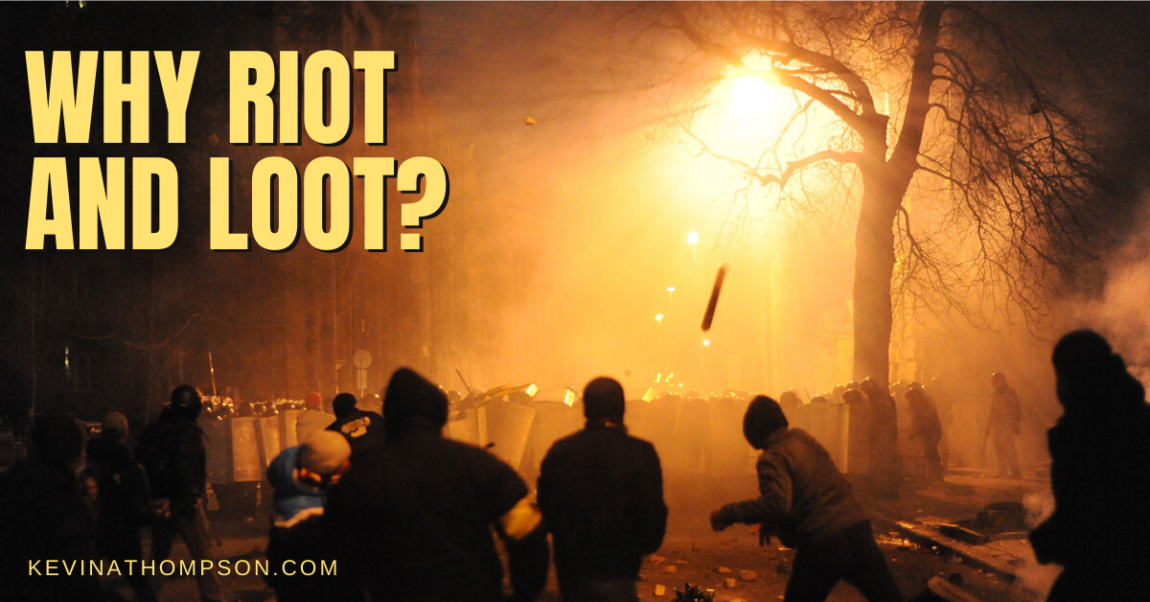I’ve been on a kick lately of taking the rhetorical questions we ask and actually trying to answer them. There seems to be a pattern on social media to ask rhetorical questions with the assumption that we have dropped the mic on our ideological opponents. Yet in many instances, the very questions we are asking should actually be answered. For if we answered those questions, we would have a greater insight into ourselves and others (For example, see: Why Can I Go to Wal-Mart and Not Church?)
One question plastered on social media is “why riot and loot?” In wake of the apparent murder of George Floyd by one or more Minneapolis police officers, protests in Minnesota spread across the nation and escalated into the destruction of physical property. While some have taken advantage of the situation for political or personal gain, some of the protesters have turned to the destruction of property not knowing how else to get the attention of apathetic Americans.
This quickly raised the question on social media, primarily among white Americans, “why riot in response?” In part, the question is fair, especially when much of the destruction is in already underserved neighborhoods and businesses are owned by members of the very community being oppressed. (For a powerful speech made by an activist in Atlanta on reasons not to riot or loot, see here.)
Yet there is another way to approach this question. Rather than directing it toward those who are on the streets, what if we directed it back to those most tempted to ask the question. What does the rioting and looting of others reveal about us?
Many Americans love their power and their possessions more than they love some people. That’s the revelation. And before you and I assume we aren’t part of the “their,” we should be very careful. I assume the statement is true about me–I love power and possessions more than I love some people.
Not all people. There are a good number of people that I would put above power and possessions. I would easily let my house burn in order to save my wife and children. I would have no problem giving up positions of influence in order to keep some friendships or protect some people.
The problem is that it isn’t true for ALL people. I find such comfort in systems that are set to my benefit and such well-being in possessions, that I will hold onto those two things at the expense of some people. Those people are created in the image of God. They have value and purpose. Yet I’m willing to overlook God’s image within them in order to protect my higher loves, namely power and possessions.
While I can easily say rioting and looting are not the answers to the world’s problems, the truth is that rioting and looting are far more effective than I would like to admit because they are attacks on things that we love. The prophets regularly warn us about unholy affections at the expense of others. (Isaiah 10.1 “Woe to those who enact evil statutes and to those who constantly record unjust decisions so as to deprive the needy of justice.”)
If we loved all people more than power and possessions, the video of George Floyd’s murder would have been enough to drive us into action. Not only would systems and institutions in Minnesota quickly change, but across the country, the video would have caused us to look at our own lives, systems, structures, and institutions, ensuring that they are set up to assist all people and not slanted to our benefit.
But the video did very little. We might have been outraged, but by the next day we would have moved onto the next major story. However, when the crowds moved to the streets, we became more focused. When buildings and businesses began to burn, the issue became more significant. Why?
Why would the burning of buildings and the destruction of businesses bring more outrage than the unlawful death of a man? If we were honest, we would have to admit it’s because we value our possessions more than we value some people?
Why after years/decades/centuries of stories like this do we still have systems which are slanted toward the advantage of some and against others? It’s because we value our privilege and power more than we value some people.
I don’t condone riots or violence. I’m heartbroken as I watch buildings burn. It’s especially tragic considering many of these neighborhoods are the ones who need more development, businesses, and attention. I worry for those on the streets and for the officers outraged by their colleagues while also trying to maintain order in the aftermath. (See: The Best Book I’ve Read in Five Years)
But even as the riots are happening, I am reminded that I am partially responsible. For as long as my heart values power and possessions over some people, I should expect God to allow those idols to be revealed as he invites me to repent.
For more, hear from some of the people I go to church with Jay, Steven, Aletha, and Precious,
Photo courtesy: http://mstyslavchernov.com/




10 Responses to Why Riot and Loot?